
THE HANDSTAND
MAY 2005
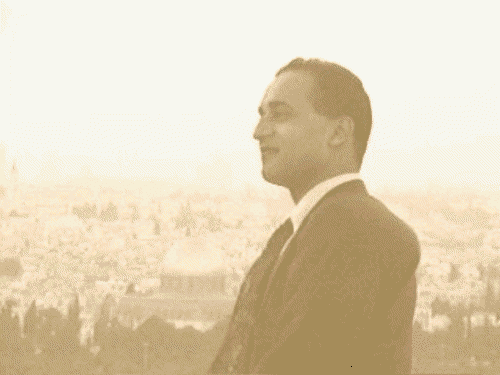
Doc Jazz
Intifadah
(alternative version)
Occupation is a hazardous game
If you get your hands dirty it will burn you like a flame
They want us to bow down surrender our home town
For building colonies creating a show down
It's not political or meta-analytical
It's plain and straight war crimes targeting civilians
North American Indians, Australian Aboriginals
The people of the land all wiped into oblivion
It is never right to steal another
people's country
Your uebermensch philosophy has smothered your morality
No fake excuses, no media control
Can cover up the crime
It is vivid to us all
Because in Palestine
There are people trying
Just to live their life in peace
Though they're occupied
You can't control their lives
Because they're fighting to be free
Have you heard the story about 1948
I'm sure you've heard a story but not what took place
Ethnic cleansing like the kind you saw in Kosovo
Protected by the powerful and treated o so loveable
Justice? seems they don't know what that
is
They say: power is a healthy way of solving this quiz
Military power, economical power
Without continuous infusions they wouldn't last an hour
You better stop breaking our bones
You better stop wrecking our homes
You better stop stealing our lands
Beware of the anger of the innocent
Because in Palestine
There are people trying
Just to live their life in peace
Though they're occupied
You can't control their lives
Because they're fighting to be free
It's a tragedy of inhumanity
Would you rather close your eyes?
Can't go on this way
Just wake up someday
Or you will have to pay the price
People of the world beware of Zionism
It's a racist ideology like National Socialism
United Nations Resolution 3379
You wiped it from the records but not from our minds
We will never give up
We're ready for the fight
Never give up
Beloved Palestine
Never give up
The struggle to survive
We're rising up
To rescue Palestine
We will never give up
We're ready for the fight
Never give up
Beloved Palestine
We're rising up
Intifadah
We're rising up
Intifadah
(©Copyright
© 2003 Doc Jazz)
Doc Jazz is a Palestinian in the Netherlands who, being a multi-instrumentalist on piano, guitar, bass and drums, writes and records his own songs, next to being a full-time surgeon
Home
(for Jenin)
(Doc Jazz)
Desolately
looking at what once was home
And wondering why it had to go
The little girl swallows her tears
Yesterday the soldiers came
Took everything she had away
Nothing left to live off but her fears
This crazy world is letting
The culprits get away
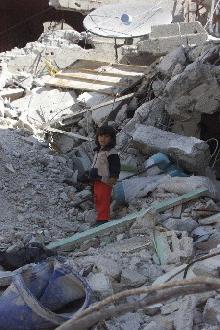
Refugees in their own land
Deported by a savage hand
And thrown into famine and despair
But around her neck the front door keys
Will keep alive the memories
Returning home is now her only care
And now she still remembers
How daddy used to say
Home is always in your heart
They can't take that away
Be strong, even when life gets rough
And nothing seems to go your way
Someday, justice will overcome
Their lies will fall apart
But till then let home live in your heart
Nightmares from the screams at night
Are keeping her from sleeping tight
Images of fire, blood and tears
The occupation is a crime
Defenceless people terrified
As desperation grows throughout the years
Resisting occupation
Is the only thing to do
Whatever happened in Jenin
Was deliberately kept unseen
A shameless crime was covered up in veils
But as time goes by we won't forget
The truth will be uncovered yet
As long as we are there to tell the tale
Copyright 2002, Doc Jazz
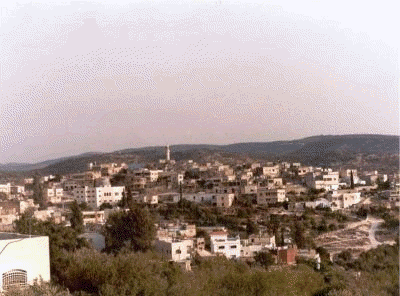
Doc Jazz' true home
Doc Jazz is a Palestinian in the Netherlands who, being a
multi-instrumentalist on piano, guitar, bass and drums,
writes and records his own songs, next to being a
full-time surgeon.
Latest News:
Doc Jazz's music was recently featured on national TV in
the Netherlands, with the satirical song "Balken van
Ellende", about the Dutch prime minister Balkenende!
Check out the video: Doc Jazz on TV!
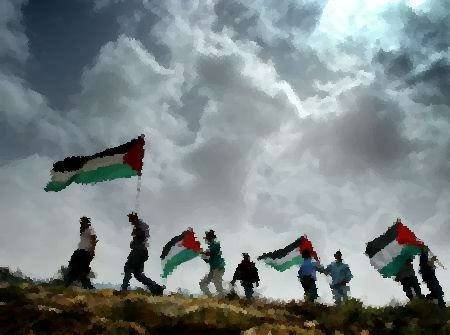
Doc Jazz's latest CD "Creative Resistance"is
out, and this time it is for sale online! The revenues
will be donated to Stop the Wall (which will mean 5$ per
CD that is sold!)
Obtain your own copy at the AMPCAST online CD shop, and
support the Anti-Apartheid Wall Campaign!
With regards to the style of music, it varies too much in
style to be caught in one genre. Most of his songs have a
jazzy feel, but some of his songs are rap, some are rock,
some are piano ballads; even reggae and blues are
included in the repertoire. Though most of the songs have
English lyrics, some songs are in Dutch, and some in
Arabic.
Music with a message
The songs are also featured on his website "The
Musical Intifadah", and all songs written since
December 2000 are distinctly political in nature, with
lyrics pertaining to the Palestinian struggle for
liberation, but some also deal with the invasion of Iraq,
and social injustices concerning muslim minorities in the
West. The older songs deal with various aspects of daily
life, and have recently been added to this collection.
If you are not familiar with the music of Doc Jazz, you
are missing out on some important musical messages, all
of which are based on the equality of all human races,
the right of all the indigenous peoples of this world to
total sovereignty, and the opposition against
imperialism, colonialism and all types of racial
exclusivism, including zionism.
Read the interview at the Palestine Chronicle
Read Doc Jazz's essay at the Centre for Political Song
(Glasgow Caledonian University)
The Musical Intifadah
Features all the political songs of Doc Jazz
Dreams
Features all the non-political (usually older) songs of
Doc Jazz
THE INTERVIEW 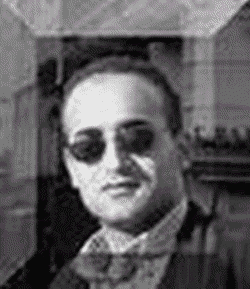
Why this name?
During my internships, my colleagues nicknamed me
"Doctor Jazz", because of my affinity with
music.
Do you play live?
My profession allows little time for live performances,
although it does happen sometimes. On the 9th of November
2003, the International Day Against the Israeli Apartheid
Wall, I performed live on a big square in Amsterdam at a
manifestation. Since my music is usually
multi-instrumental, but I don't have my own band, it is
not customary for me to perform my songs on stage,
although I definitely believe that live music is still
the ultimate way of making music.
How, do you think, does the internet (or mp3) change the
music industry?
I guess that without the internet, I could have never
published my songs anywhere, since I am totally outside
of the professional music industry. My music is a way of
conveying a message, so I definitely encourage free
downloading and distribution. I would love it if the
message came across, and I wouldn't expect anything in
return, since the spreading of the message is a reward in
itself.
Would you still sign a record contract with a major
label?
Since I would consider this yet another way of making the
message heard on a wider scale, I think I would, if the
terms were acceptable. However, if my music should get
enough exposure without a label, simply through internet
distribution, I would rather remain completely
independent.
Band History:
I started composing songs somewhere in my teens. My first
song ever was about famine in Africa. Afterwards, I
composed many songs, sometimes working with other
musicians, about various aspects of life, including love
songs. As my medical career became more demanding, I
eventually stuck to "home recording", which was
also my only way of composing, because of my inability to
read and write notes. As I gradually became able to play
more instruments, my music has now basically become live
recording of separate tracks, usually in one or two takes
per track (hence the uncorrected mistakes), since I don't
have time to re-record tracks over and over again until
they are flawless. I used MIDI in previous times, but all
my latest songs are free-hand, and played
"live" on real instruments. Hopefully, I will
someday have the time to make more professional sounding
recordings.
Your influences?
Many people call my music "mellow"; personally,
I don't know what to call it. I know I believe there is
good and bad music in almost all styles, and I do listen
to a variety of genres. Artists I greatly admire, but do
not necessarily feel I imitate or emulate, are Stevie
Wonder, Al Jarreau, Michael Franti, Michael McDonald,
Donald Fagen, George Duke, George Benson, Little Feat,
and so many others ... I'm sure if you mentioned a few I
would find some among them that I think are great.
Favorite spot?
My favorite city is Al Quds, internationally known as
Jerusalem. I don't think that needs any explanation.
Equipment used:
In my music I usually make use of my Yahama Stage Custom
drumset, my Daion Power Mark XX electric guitar, my Hondo
classical guitar, my Roland keyboards (either on the
G-800, but without using the "styles", or on
the XV-5050; most of the time I use it as a piano) and a
Cort bass. I record the songs in Cubase SX, or on the
Roland VS-880EX (which I find too unpractical most of the
time). I use simple dynamic microphones for the vocals,
and have recorded most of the songs on a Sound Blaster
Audigy sound card. The Arabic instruments I play are Ud
(Arabic lute), darbekkeh (hand drum) and shibbabeh
(Palestinian shepherds' flute); on occasion, they are
used in the songs here.
American Soldier
Words & Music by Doc Jazz
Never thought youd ever be here, did you
now
Never thought youd ever see this, did you now
What you doing in these far away places
Facing unknown faces
Of various races
Some are friends some are foes
But who can be a war hero
In a war that brings destruction
To a land already torn
Did you actually believe it
When they said you could achieve it
And now you're fighting for a goal
But ur not sure if you will see it
Cuz a lot of your friends have gone home in bags
What exactly did they die for
covered in flags
Get your ass back home
Your girl is waiting alone
And your mom's apple pie
Is still hot on the stove
And only God knows how you miss the USA
Get your ass back home
Cuz your war is wrong
Cuz they made you a killer
of the innocent ones
And only God knows how you miss the USA
(©Copyright
© 2005 Doc Jazz)
..................................
©1997-2003
SoundClick. All rights reserved.
| Frank
Zappa's treasure house Gail Zappa has a hoard of music that could fill a hundred albums - and she hopes to 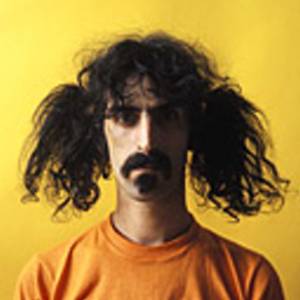 release
it, bit by bit, writes Germaine Greer release
it, bit by bit, writes Germaine Greer Thursday April 14, 2005 The Guardian I met Frank Zappa in 1973, I think it must have been, over breakfast in Hernando's Hideaway, the coffee shop of the Beverly Wilshire hotel, where he and his wife Gail were staying while their house in Laurel Canyon was redecorated. Their attention was drawn to me because of the staccato rustling of the rice-paper of my airmail copy of the Times, and the deep sighs I kept heaving. They asked me what was on my mind, that I sighed so often and so deeply. "My boyfriend in Detroit has just told me that he's got pubic lice. He thinks I gave them to him. I'm worried that the bastard has given them to me." "Not a problem," said Frank. His black Rolls-Royce with tinted windows was waiting in the hotel driveway; in no time we were at Schwob's drugstore, and Frank was yelling over the heads of the would-be Lana Turners twirling on the stools at the counter: "Blue lotion, please, blue lotion for the crabs." The words rang out like a triumphant fanfare. Gail and Frank were like the only two sane people in that hideous town, which always seemed to me the antechamber of hell. They didn't do Rodeo Drive or the Polo Lounge. They were happy to hang out with each other and their kids. Their kids actually liked them, which, in that madhouse of chaotic kinship and serial divorce, was special to say the least. Frank spent as much time as possible, which wasn't enough, in his studio under the house, making electronic music. And once or twice he played stuff back for me, stuff that I absolutely did not understand. I said nothing intelligent about it, but nothing stupid either, I hope. Now I'm sorry that I didn't listen harder and ask more questions. Now I've got to play catchup and try to find more of Frank's "serious" music. It's not easy. I just paid a fortune to download the Rykodisc releases from the internet, but my operating system wasn't up to it, and all I got for my money was the titles of the files. I came to rock'n'roll late, via rhythm and blues. I was never all that convinced by the posturings of the top earners with their lip service to the anti-war movement and the counter culture. I knew the Fugs long before I knew Zappa, and listened to his music in the same spirit, seeing it as an ironic, sometimes savagely satirical version of mass culture. I almost certainly imagined him to be a lot more radical than he was; I never doubted that he took drugs - which he didn't - and I thought he probably helped himself to the heaps of groupies that were lying around - he didn't. He loved his wife and the children he had with her too much for that. Where he was radical, and this I didn't get, was in his music. All the touring and recording was to finance his composing. What seemed to me to be satire was indeed disabused pastiche. He was doing it and doubting it at the same time. I loved the way Frank looked, with his narrow, long head, his intelligent eyes, and the Dionysiac curve of his grin, emphasised by his jet black moustache and beard, and the surrounding cloud of floating blue-black ringlets. He was proud to look so exotic because it was a visible acknowledgment of his Italian and Sicilian forebears. What was more, it brought out the worst in people. I had loads of his commercial albums, Weasels Ripped My Flesh, Hot Rats, Burnt Weeny Sandwich, Just Another Band From LA, Ruben and the Jets, We're Only In It For the Money, Lumpy Gravy. They weren't really all that commercial. Frank was never in the really big money. I fancy all his spare cash went in expensive collaborations with orchestras, and in developing the studio where he laid down track after track, doodling on his synclavier. I didn't know the half of it. Already in the late 1960s he was working with Jean-Luc Ponty on the King Kong music. I didn't know about his concerts in celebration of the work of Edgar Varèse; nor did I know that he has been a fan of Varèse ever since he was a schoolboy. He conducted memorial concerts for Varèse in New York and San Francisco; in 1993, four months before his death, Frank conducted the Ensemble Modern in a full programme of Varèse. The Ensemble Modern also recorded an album of Zappa's compositions called The Yellow Shark. Four months later Frank was dead. I've come back to Frank's music through being involved with the small but perfectly formed Britten Sinfonia, who occasionally include Zappa pieces in their repertoire. Modern classical music, which I thought was a dire cacophony 30 years ago, is now becoming legible to me, partly because for the first time I am hearing it properly played, so that the musical structures are at last standing free and clear. I'm at the point where I could really understand the Zappa project, even though music scholars are now using rather chilling rhetoric to describe his big-note theory and his maximal aesthetic. In Frank's world, every sound had a value, and every action was part of the universal diapason, a colossal vibration that made energy rather than reflecting it. I'm grown up enough now to get it, but the bulk of Frank's music is still unheard and likely to remain unhearable. Gail Zappa is now in control of the treasure house that I glimpsed all those years ago. She is anxious that Frank's legacy not be adulterated or exploited in the wrong way, and so far access to his compositions has been strictly limited. She hopes to bring out as many as a hundred albums on a new record label, Vaulternative Records, produced by Dweezil Zappa. Master tapes finished by Frank already exist for many of them. Meantime we have to make do with small masterpieces that have somehow escaped from the vault, such as G-spot Tornado, which I want played at my funeral. There are two versions extant, one by the Ensemble Modern at breakneck speed and one by the Britten Sinfonia at half the pace. The Britten Sinfonia performance is sexier and more ironic but Frank probably had more to do with the earlier performance. As things stand at the moment, Gail will probably veto any performance of the work done either way. The
piece reminds me how Frank could inject
excitement into the most mundane occasion. Once
at the supermarket, Frank was sauntering along
behind as we two women pushed our trolleys and
minded our own business. He was fetchingly clad
in a violent turquoise coloured cat-suit which
was unzipped to below the navel, showing a
plentiful growth of silky black hair with no sign
of underwear. A pair of shoppers became
fascinated by this spectacle and began following
him about, the woman tittering and making loud
comments. Frank stood it as long as he could, and
then turned to her and roared: "Eat! My!
Shit!" She went white with shock. Her male
companion, who weighed four times as much as
Frank, threw a punch at him. Frank stepped back
out of range, unfazed. He eventually talked his
way out of trouble, but it took a while.
Eccentricity amid conformity was the name of
Frank's game; in Beverly Hills in the 1970s,
eccentricity could be downright dangerous. |